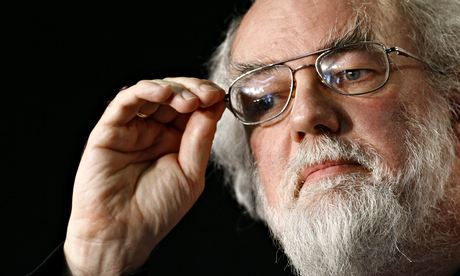
This collection – a vigorous compilation of old and new poems including translations of Rilke and of several Welsh poets – gets off to an unexpected start with an introduction to a "Mrs Noah", who is drying ferns out on deck: "I am Mrs Noah: I call the beasts home/together, the cat to lie down with the slug…" It is a charming poem and the unlikely bedfellows a fitting beginning for a motley volume filled with cultured reflection and surprise. One surprise is that the former archbishop of Canterbury does not wish to be thought of as a religious poet but as a poet to whom religious things matter "intensely".
On the evidence here, the broader definition suits. Many poems are devotional in a secular way and some not obviously devotional at all. Take Dejeuner sur l'Herbe, presumably inspired by Manet's painting, in which Williams wonders (as everyone must) what happens next: "Shall there be wine to drop/on the drab summer grass/or only hours' worth of spent sands?" The oddity here, if he is alluding to the painting, is that there is no wine visible on canvas: it is the archbishop who brings a bottle to the party.
Other poems are less ambiguously inspired by art (Rodin, Gwen John, Velázquez) and by music. Here, poetry's job is as an accompanist. But such exercises in two-part harmony are difficult. In Bach for the Cello, the music resists description and perhaps the reason is already given away in its opening line: "By mathematics we shall come to heaven."
At any rate, the attempt to salute Bach with laboured geological imagery does not work: "Passion will scorch deep in these sharp canals" is overwritten. The collaboration with Velázquez is more successful. I liked the nimble ventriloquy in the dwarf's riposte to King Philip IV in Los Ninos:
Down where you do not come
there lives the world of little folk.
bright, bitter, sniggering
at your swelled dramas. Why?
down here we're hungry:
concentrates the mind.
But the collection's most intriguing poem is Dream. It is arresting because the self-conscious (and many of the poems here are self-conscious) is overtaken by the subconscious. What a strange dream this is – far from transcendently religious. It is so vivid one feels one is dreaming it oneself. Yet one wonders: where is God in this deadly nest of wasps and conferences on violence and copious tears; this place at the end of the world?
If it is some intimation of the divine you are seeking – understandable when plundering an archbishop's poems – you will find it at its finest in a translation of a poem by Ann Griffiths. The difficulties of translating from Welsh are explained in the introduction: "complex internal assonance and rhyming" disappears. And "renderings of poems in metres more recognisable to English readers, like Ann Griffiths's hymns, can soften the odd and 'baroque' quality of the strings of imagery". It would be good to hear the Welsh musicality of the original, but this English version is outstanding. What is so moving about I Saw Him Standing is the poem's unhedged directness, its piercing quality, its blend of yearning and revelation. For this is a vision about waiting to see:
Under the dark trees, there he stands, there he stands; shall he not draw my eyes?
I thought I knew a little
how he compels, beyond all things, but now
he stands there in the shadows. It will be Oh, such a daybreak, such bright morning,
when I shall wake to see him
as he is.

